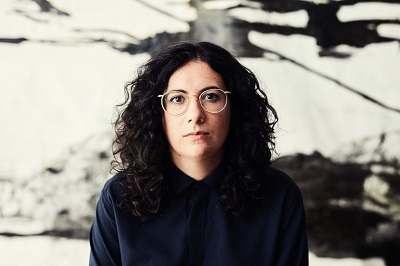The 2019 Montréal Pride festivities are on until Aug. 18, and the event aims to unite all, and make our differences disappear. With art as the main uniting force, the whole world is converging on Montréal so that we can all showcase what we have in common.

Alexandra Stréliski (Photo: Raphael Ouellet)
“I’ve accepted the offer to participate in the Pride festivities mainly because I truly believe in diversity, justice, and equality,” says pianist Alexandra Stréliski. “Tolerance and goodwill are principles that I deeply believe in, and I think we still have a lot of work to do – both locally, and especially elsewhere in the world – to raise the awareness of people with regard to sexual and gender diversity.”
Created in 2007 by the various communities on the sexuality and gender-diversity spectrum, Pride Montréal has become the biggest event of its kind in the entire Francophone world.
Artists from the LGBTQ+ communities are featured throughout the festival, as are their allies, with the goal of showcasing everything good that comes from being united. The Pride Montréal Festival celebrates diversity by allowing everyone to shine.
According to Jean-François Guevremont, the Pride Montréal Director of Programming, this unique environment of peace and celebration is extremely useful to provide answers to those who seek them, and even to those who don’t even intend to ask the questions. “We use the arts, various activities, and mostly music from local artists that people can relate to, in order to communicate positive messages to the people who gather together,” says Guevremont. “Pride Montréal is a great opportunity for people who are questioning themselves to meet our organizations and find more information. It’s important to note that we’re on a continuous learning path. Understanding a non-binary person can be challenging for some people, and it’s easier in an environment that’s pleasant and festive.”
“In the end, I think there’s no better setting than a huge, love-filled festival to unite people and let them be heard.” – Alexandra Stréliski
To Guevremont, diversity is more than homosexuality, and education is key. Alexandra Stréliski couldn’t agree more. “All celebrations are important!” she says. “In the case of Pride, it is also, obviously, a question of visibility. We may think the issue of homosexuality has progressed in Canada, and although it might be true for homosexuals, the LGBTQ community is a lot more diverse than we can imagine. Nowadays, we’re also talking about the visibility of non-binary persons, bi-sexual, pan-sexual, and trans people, and many more. In the end, I think there’s no better setting than a huge, love-filled festival to unite people and let them be heard.”
Two years ago, Pride Montréal became Canada’s largest LGBTQ+ event. “We get huge media visibility,” says Guevremont. “We can count on our artists to promote our political agenda. Music captivates you and invites you here, but we also have community programming that focuses on advocacy. It’s all very important.” Alexandra Stréliski will perform on August 14th, in a show titled Vagues, and she believes that, in our position as a province and as a country, it’s crucial to put ideas front and centre. “I believe Canada, and especially Québec, can be examples to follow for other less progressive places,” she says.
Her concert will gather several artists of the “new wave.” Safia Nolin, Beyries, La Bronze, Geoffroy, Annie Sama, Anthony Carle, Wake Island and Mathis Xavier will all share the stage with her.
Music is a language that facilitates everything, according to the program director. “Regardless of whether those artists are part of the diversity, they show up to champion a message,” he says. “It’s a statement they’re making when they show up by our side. Being open is one thing, but taking action can actually change things. A lot of people were surprised by the presence of Claude Dubois, on Sunday, for example. People who aren’t on board with diversity need to see people like him take a stand. The surprise of those people is very positive for us.”
On the music front, Guevremont works year-round to book artists that will attract as many festival-goers as possible. “I go to a ton of events and I do my research,” he says. “We hold consultative meetings. We were super-happy to have an ambassador like Ariane Moffatt for the opening show. We’ve been trying for years to have her, but the schedules were never aligned. We’re also grateful for the presence of other personalities, such as Roxane Bruneau, Debbie Lynch-White, and Safia Nolin. And we’re proud to offer exposure to up-and-comers like Antony Carle, for example.”
While we hear a lot about the lack of women in most festival line-ups, Guevremont is quick to mention their lack of diversity. “People tell us there’s a lot of drag queens in our festival, but have you ever seen one at Osheaga?’ he asks, rhetorically. “No! We only have three out of 20 shows that feature drag queens. That’s not a lot, especially when you consider that this makes up for their total absence in other music festivals.”
He believes evolution is a never-ending process. “A few years ago, people told us there were a lot of allies and not enough queer people,” he says. “We strive to be as representative as possible. We have many lesbians from the music industry. It’s a step in the right direction. We want to be diversified musically in order to attract people with a variety of musical tastes.” To Guevremont, it’s also crucial that major festivals in Québec and Canada stop “ticking diversity boxes: a gay guy, a trans person, a woman, etc.”
One thing’s for sure: music remains a conduit for positive messages, no matter what the message is. “I believe music can be a balm for the hearts of those who need it,” says Stréliski.” Whether those hearts are queer, L, G, B or T… We’re all the same in our human experience, and that’s what I want to champion.”